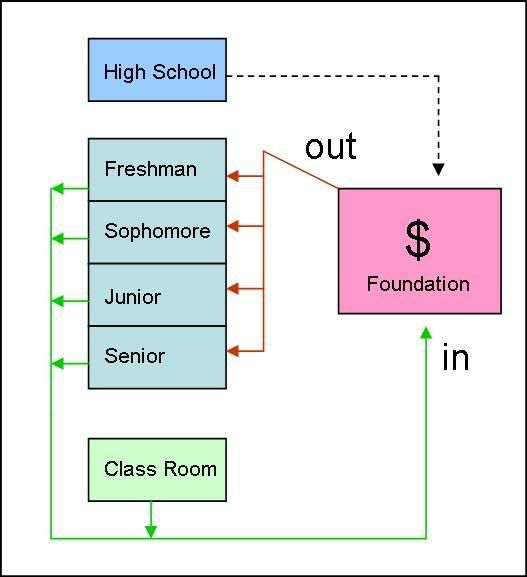Here is my first brain dump of an idea: Learn to Teach to Learn
Basically a scholarship system that is paid off by students receiving the scholarship teaching in a public school upon graduation and intermittently during their undergrad years

Mission:
The mission of this system is to allow students a source of funding for collegiate study that is paid back incrementally by their hours of service during their collegiate career and by a full year of teaching in a public school upon graduation. The other side of the position is that there are a lot more available teachers for public schools and teachers that are more in touch with students needs, because they too have recently been students.
System:
1) High school seniors apply to college of their choice and apply to the Learn to Teach to Learn foundation.
2) Accepted applicants are contracted into a 4 year agreement, where they will receive funding at $10,000 for 4 years with an agreement to teach 1 year in a public school upon graduation as a volunteer.
3) During the years in college the student will have an obligation to work at a local school for 5 hours a week. The student may tutor, assistant teach or do other jobs as deemed necessary by their work site. The foundation will be paid by the work site for hours of service performed. The pay rate will be at a discounted rate, so as to make the labor competitive. This work should enhance the fellow's knowledge of the school environment from a professionals perspective and at the same time pay back against the capital borrowed. 5hrs x 30 weeks = 150 hours. At $8 per hour this is $1,200, which covers the interest on the foundation's money and starts to pay down a little bit of the capital.
4) Upon graduation the fellow applies to work at a public school. The fellow is housed and given a monthly stipend (see vista, americorps, teach for America as examples). The school pays a base minimum salary to the foundation for the fellow to act as a teacher for the entire year. Minimum teaching salaries range from $25,000 to $45,000 per year. Including the $4,800 that the fellow has generated during their undergraduate years the foundation has the possibility of having anywhere between $30,000 and $50,000 returned upon their $40,000 5 year investment. The foundation would have to find a way to come close to break even by balancing out where fellows end up teaching or by asking for more hours of service in the undergraduate years.
I don't have good research numbers on the proposed system and think the foundation may be more stable if it is open to placing fellows in private schools where they could generate more revenue to pay back into the foundation.
Right now tons of money goes flowing out into scholarships that never comes back to directly effect the system its paying into (education). I received grants on a yearly basis that paid for my entire education, but then had no obligation to do anything with the education the grants had paid for. The government and money givers basically are left crossing their fingers hoping I'll do something important that makes the overall economy better or ??? The entire scholarship/grant system is too open ended and not reliant on some sort of return on investment, where if some value could be getting trapped and used to leverage even more scholarships and grants we would be making secondary education even that more accessible to the masses.
At its heart though I think this program would give more academic students exposure to being a teacher that may lead more of them to go into the field of teaching. Anyone who has ever taught in a classroom also knows that the best way to learn anything is to teach it, so even if these fellows don't become teachers...they become experts in their fields of study and have paid off the scholarship money that got them there. Also the Learn to Teach to Learn exposes students in high schools and elementary schools to young people that have recently gone to college, which pays off in at least 2 distinct ways 1) Role models 2) fresh and new ideas of how to teach
No comments:
Post a Comment